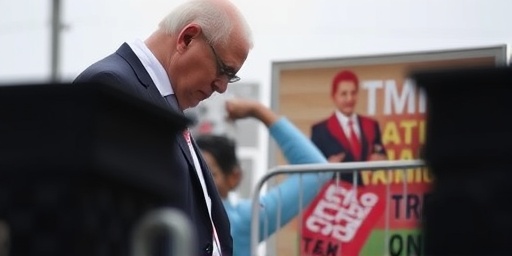In a bold move that has sent shockwaves through Minnesota’s vibrant Somali diaspora, President Donald Trump announced on Thursday his administration’s intention to immediately terminate Temporary Protected Status (TPS) for thousands of Somali immigrants, potentially paving the way for mass deportations and upending lives built over decades.
- Somali Minnesotans Face Sudden Threat of Uprooting After Decades of Integration
- Trump’s Immigration Policy Overhaul Targets TPS Amid Rising Political Tensions
- Heartbreaking Stories Emerge from Minnesota’s Somali Community on the Brink
- Legal Battles and Political Pushback Loom Over TPS Termination
- Future Uncertainties: What Lies Ahead for Somali TPS Holders and U.S. Policy
The decision, revealed during a White House press briefing, targets the TPS program extended to Somalis since 1991 due to ongoing civil unrest and humanitarian crises in their homeland. With Minnesota home to one of the largest Somali communities in the U.S., local leaders and families are bracing for uncertainty, as the policy shift could affect up to 1,500 Somali TPS holders nationwide, many of whom call the state their home.
Trump framed the announcement as part of a broader crackdown on what he called ‘outdated immigration loopholes,’ emphasizing national security and resource allocation. ‘We’re ending these temporary protections that have become permanent stays,’ Trump stated, underscoring his long-standing push to reshape U.S. immigration policy. The pledge aligns with his administration’s aggressive stance on programs like TPS, which have been extended multiple times under previous presidents but now face abrupt curtailment.
Somali Minnesotans Face Sudden Threat of Uprooting After Decades of Integration
For Somali immigrants in Minnesota, the news hits like a thunderbolt, threatening to dismantle the stability they’ve fought to achieve. The state, often dubbed the ‘Twin Cities’ hub for East African newcomers, hosts over 80,000 Somali Americans, according to the Minnesota Department of Health. Many arrived as refugees fleeing Somalia’s brutal civil war, which began in 1991 and has persisted through famine, terrorism by groups like Al-Shabaab, and political instability—precisely the conditions that qualified Somalia for TPS.
TPS, a humanitarian measure under U.S. immigration law, allows nationals of designated countries to live and work legally in the U.S. temporarily when returning home would pose extreme hardship. For Somalis, the program has been renewed 14 times, most recently in 2022 by the Biden administration for 18 months. Trump’s pledge to end it ‘immediately’ signals a reversal, with implementation possibly starting as early as next month pending legal reviews.
Local advocate Amina Hassan, executive director of the Somali American Community Center in Minneapolis, described the announcement as ‘devastating.’ ‘These families have built businesses, raised children in our schools, and contributed taxes for years,’ she said in an interview. ‘Ending TPS isn’t just policy—it’s ripping apart communities that have become the heart of Minnesota.’
Statistics paint a stark picture: Somali immigrants in Minnesota boast a median household income of around $35,000, lower than the state average, but they’ve shown remarkable entrepreneurial spirit, owning over 600 businesses in the Minneapolis-St. Paul area alone, per a 2023 report from the University of Minnesota. Deportation fears could lead to economic ripple effects, including labor shortages in sectors like transportation and retail where many TPS holders work.
Trump’s Immigration Policy Overhaul Targets TPS Amid Rising Political Tensions
President Trump’s vow to dismantle TPS for Somali immigrants fits into a larger pattern of overhauling U.S. immigration policy, one that has defined his political legacy. Since taking office, Trump has prioritized border security and reduced legal immigration pathways, viewing programs like TPS as magnets for abuse. In 2017, his administration attempted to end TPS for several countries, including Haiti and El Salvador, though courts blocked many efforts.
This latest pledge comes amid escalating debates over immigration ahead of midterm elections, where border issues remain a flashpoint. Trump highlighted data from U.S. Citizenship and Immigration Services (USCIS), noting that TPS beneficiaries—totaling about 700,000 across all countries—cost taxpayers billions in services. ‘It’s time to prioritize Americans first,’ he asserted, linking the policy to broader economic pressures like inflation and job competition.
Experts trace the roots of this decision to executive actions Trump could pursue upon potential re-election or through current influence. Immigration attorney Omar Jamal, based in St. Paul, explained that TPS termination requires a Federal Register notice followed by an 18-month wind-down, but Trump’s team has signaled acceleration. ‘This isn’t hypothetical; it’s a direct assault on protections that have saved lives,’ Jamal said.
The move also intersects with Minnesota’s political landscape. Governor Tim Walz, a Democrat, has championed immigrant rights, signing laws in 2023 to expand driver’s licenses and healthcare access for undocumented residents. Walz’s office issued a statement condemning the pledge: ‘Minnesota stands with our Somali neighbors against this divisive policy.’ Republican lawmakers in the state, however, have echoed Trump’s concerns, citing integration challenges in high-immigration areas like Cedar-Riverside, known as ‘Little Mogadishu.’
- Key TPS Facts: Established by the 1990 Immigration Act, TPS has protected over 2.5 million people since inception.
- Somali-Specific: Somalia’s TPS designation stems from events like the 1991 regime collapse and 2011 famine; current extension ends September 2024.
- National Scope: Other TPS countries include Yemen, Sudan, and Venezuela, potentially facing similar scrutiny.
Critics argue the policy ignores humanitarian realities. A 2023 UNHCR report warned that Somalia remains unsafe, with 3.8 million internally displaced and ongoing Al-Shabaab attacks. Terminating TPS could force returnees into peril, violating international non-refoulement principles.
Heartbreaking Stories Emerge from Minnesota’s Somali Community on the Brink
In the bustling markets of Minneapolis’s Cedar-Riverside neighborhood, whispers of fear are spreading faster than the aroma of spiced tea. Abdi Yusuf, a 45-year-old taxi driver who arrived from Somalia in 1993 under refugee status and later gained TPS, shared his dread. ‘I’ve been here 30 years, my kids are American citizens, but now? Back to a war zone I barely remember,’ he told reporters outside a local mosque.
Yusuf’s story is emblematic of many. Somali immigrants in Minnesota have woven themselves into the social fabric, from captaining youth soccer teams to serving on school boards. A 2022 study by the Institute for Metropolitan Opportunity found that second-generation Somalis outperform state averages in high school graduation rates, at 75% versus 70% overall.
Yet challenges persist. Discrimination and Islamophobia have tested resilience, particularly after events like the 2016 Orlando nightclub shooting. Community leaders report a surge in mental health issues post-announcement, with hotlines overwhelmed. ‘Anxiety is epidemic,’ said Dr. Leila Ahmed, a psychologist at Hennepin Healthcare. ‘People are losing sleep, contemplating suicide— this policy trauma is real.’
Women, often the backbone of Somali families, feel the pinch acutely. Fatima Ali, a single mother of four who works as a nursing assistant, relies on TPS to support her U.S.-born children. ‘I fled Somalia with nothing; Minnesota gave me everything. Trump taking it away? It’s betrayal,’ she said, her voice cracking during a community vigil.
- Personal Impacts: Loss of work authorization could lead to immediate job loss for TPS holders.
- Family Separations: Mixed-status families risk division, with U.S. citizen children potentially left behind.
- Community Mobilization: Rallies planned in St. Paul to protest the decision.
Nonprofits like the Advocates for Human Rights are ramping up legal aid, preparing asylum applications as alternatives. But with backlogs exceeding 1 million cases at immigration courts, options are slim.
Legal Battles and Political Pushback Loom Over TPS Termination
As Trump’s pledge reverberates, legal experts predict swift challenges. The American Civil Liberties Union (ACLU) has already filed intent to sue, arguing the decision is arbitrary and violates administrative procedures. ‘TPS isn’t optional; it’s a congressional mandate based on country conditions,’ said ACLU attorney Sophia Ortiz.
Past precedents offer hope: In 2018, federal courts halted TPS endings for Sudanese and Nicaraguans, citing inadequate rationale. For Somalis, ongoing violence documented by Amnesty International— including 1,200 civilian deaths in 2023—bolsters claims that return is unsafe.
Politically, the announcement energizes Trump’s base while alienating moderates. In Minnesota, a swing state, it could sway voters. Senator Amy Klobuchar (D-MN) vowed to introduce legislation protecting TPS holders, stating, ‘This isn’t America—tossing people into harm’s way for politics.’ On the flip side, House Republicans praised the move, with Rep. Tom Emmer calling it ‘common-sense reform.’
Internationally, the policy draws scrutiny. Somalia’s government, fragile under President Hassan Sheikh Mohamud, protested via diplomatic channels, warning of strained U.S. relations. Aid organizations like the International Rescue Committee estimate that deportations could exacerbate Somalia’s humanitarian crisis, where 7.1 million face acute food insecurity.
Economically, Minnesota stands to lose. Somali-owned enterprises generate $500 million annually, per a 2021 McKinsey report. Disruptions could hit supply chains in food services and logistics, where immigrants fill essential roles.
Future Uncertainties: What Lies Ahead for Somali TPS Holders and U.S. Policy
Looking forward, the path is fraught with unknowns. If implemented, TPS termination could begin phasing out by early 2025, giving holders time to seek alternatives like adjustment of status through marriage or employment visas. However, with USCIS processing times averaging 12-18 months, many may fall into limbo, accruing unlawful presence and deportation bars.
Advocacy groups are mobilizing nationwide, with coalitions forming in states like Ohio and Washington, home to other Somali pockets. A potential bipartisan bill in Congress, the TPS Permanency Act, aims to grant green cards to long-term holders, but faces uphill battles in a divided House.
For Minnesota’s Somali community, resilience shines through. Cultural festivals continue, businesses adapt, and youth lead voter drives. As one elder put it at a recent gathering, ‘We’ve survived worse than this—Somalia’s chaos forged us strong.’ Yet the specter of deportations looms, testing the limits of America’s immigrant promise.
Trump’s immigration policy pivot not only challenges TPS but signals deeper shifts, potentially influencing elections and international standing. As court dates approach and protests swell, the Somali story in Minnesota becomes a litmus test for the nation’s values on compassion versus control.








